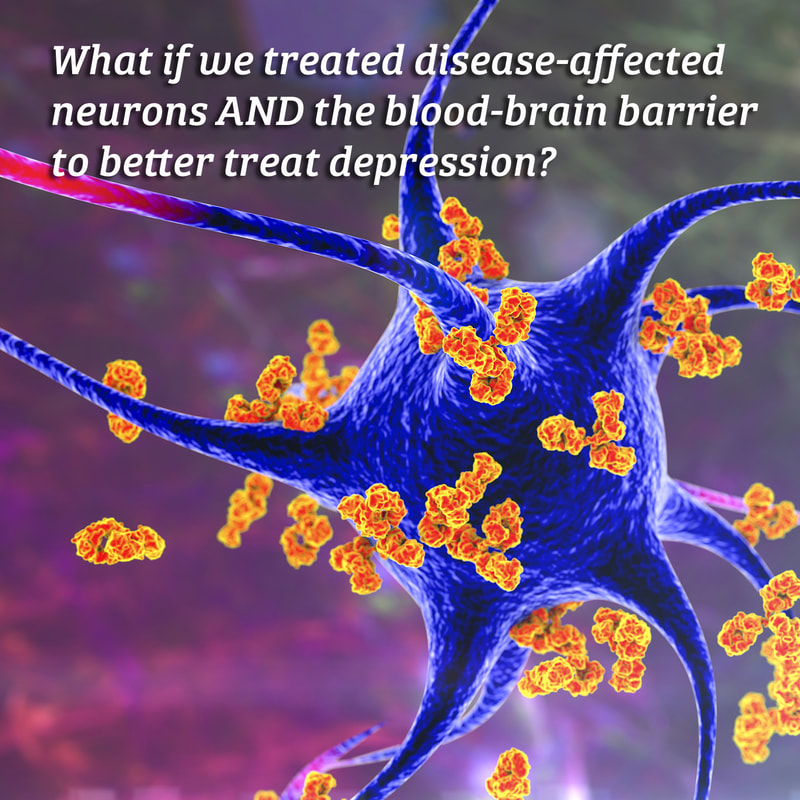A rising tide of anxiety and depression disorders demand we look first at the causal mechanisms.9/21/2020
When patients present with symptoms that may appear to result from mental health issues, integrative medicine guides us in identifying the root cause of the problems. In many instances we’re finding especially in recent times that there are many complex influences contributing to the rising tide of anxiety and depression in both adults and children alike.
The role of anti-neuronal antibodies. Research has shown that the presence of anti-neuronal antibodies, which are any of several antibodies that bind to neuronal targets, can make depression and other mental health issues much more difficult to treat with the conventional methods. The fact that anti-neuronal antibodies cause distinct clinical syndromes with prominent neuropsychiatric symptoms has shown a remarkable link between immunology and psychiatry In a three-year follow up study conducted in a private psychiatric facility in Norway, investigators posed the hypothesis that anti-neuronal antibodies may be of clinical significance in a subgroup of psychiatric patients. Scientists concluded that “anti-neuronal antibody-positive status during admission to acute psychiatric inpatient care is associated with a higher degree of depression, psychoticism and agitation at three-year follow-up. This phenotypic difference may indicate that anti-neuronal antibodies are of clinical significance in psychiatric patients, despite the absence of overt autoimmune encephalitis in the present or past.” Given that the original sample size for this study was relatively small and homogenous, recommendations included expanding upon the research through “longitudinal studies with sample sizes large enough to allow conclusions about each individual anti-neuronal antibody.”1 Other contributing factors and why some people are resistant to antidepressant therapy. There is much evidence available today to support the idea that psychological and social stressors can have a physical effect on the immune system and that our immune systems are overwhelmed now by what I call “The Perfect Storm” comprised of factors such as: • a highly toxic environment (e.g. poor air quality, pesticides, chemical toxins) • infectious triggers • electromagnetic frequencies (EMFs) from devices, cell towers and more • ingredients in some vaccines • high levels of stress • highly inflammatory and processed foods and poor dietary choices • unresolved emotional or physical trauma • alcohol or drug abuse • living or working in a moldy building • overuse of antibiotics • And many, many other negative elements to which we are exposed or consume every day, often without knowing these exist or the consequences. Through the work of brilliant researchers we now know that chronic immune activation from any source triggers chronic inflammation, which has its downstream effects on the brain and body. These inflammatory cytokines can interact with multiple pathways known to be involved in the development of depression and anxiety, including monoamine metabolism, neuroendocrine function, synaptic plasticity, and neurocircuits relevant to mood regulation. But, between 30% and 50% of those suffering from depression either respond poorly or not at all to antidepressants. So why is that? The answer may lie in current research that points to the permeability of our blood-brain barrier and the need to identify the causal biological mechanisms. Scientists at the Université Laval proceeded with the knowledge that “the blood–brain barrier is the ultimate frontier between the brain and harmful toxins or inflammatory signals circulating in the blood. Depression and vulnerability to chronic social stress are associated with loss of this barrier integrity.”2 They discovered that this permeability is due to a decrease in a protein called claudin-5, which is essentially a gatekeeper of neurological function and its dysfunction is linked to numerous neurodegenerative and psychiatric disorders.3 Findings from their work to determine what could actually help protect the brain and promote stress resilience included that “To better treat people with depression, not only must we treat the neurons affected by the disease, but we must also restore the integrity of the barrier that regulates exchanges between blood circulation and the brain." Their conclusions reinforce the importance of considering stress-induced neurovascular pathology in depression and provide therapeutic targets to treat this mood disorder and promote resilience. It also helps shed light on why some patients find no relief at all from available antidepressant medications that don’t act upon the biological cause or dysfunction of the mechanisms. We truly need a revolution in mental health care and an army now of those that understand the immune actions of neuropsychiatric symptoms. Certainly the field of psychoneuroimmunology has brought forth major scientific insight to explain some of the mechanisms in a subpopulation of patients. But there is a clear demand for further research that will result in additional therapeutic measures that more effectively target the source of these disorders in order to offer relief for what is and may well be an increasing number of affected individuals. I will look forward to learning more. In hope and healing, Dr. Suzanne Gazda References: 1 Schou, M.B., Sæther, S.G., Drange, O.K. et al. The significance of anti-neuronal antibodies for acute psychiatric disorders: a retrospective case–controlled study. BMC Neurosci 19, 68 (2018). https://doi.org/10.1186/s12868-018-0471-7 2 Katarzyna A. Dudek, Laurence Dion-Albert, Manon Lebel, et al. Molecular adaptations of the blood–brain barrier promote stress resilience vs. depression. Proceedings of the National Academy of Sciences Feb 2020, 117 (6) 3326-3336; DOI: 10.1073/pnas.1914655117 https://www.pnas.org/content/117/6/3326 3 Greene, C., Hanley, N. & Campbell, M. Claudin-5: gatekeeper of neurological function. Fluids Barriers CNS 16, 3 (2019). https://doi.org/10.1186/s12987-019-0123-z https://fluidsbarrierscns.biomedcentral.com/articles/10.1186/s12987-019-0123-z#Sec18 Additional reading: See also Neuroscience News, https://neurosciencenews.com/bbb-depression-15539/ Social defeat and the brain: new study reveals additional effects of stress. https://www.suzannegazdamd.com/scientifically-speaking1/social-defeat-and-the-brain-new-study-reveals-additional-effects-of-stress
0 Comments
Your comment will be posted after it is approved.
Leave a Reply. |
AuthorDr. Suzanne Gazda, Integrative Neurology Archives
February 2024
Categories |

 RSS Feed
RSS Feed